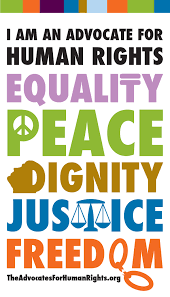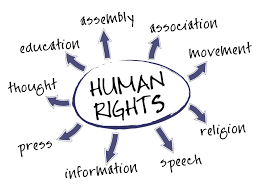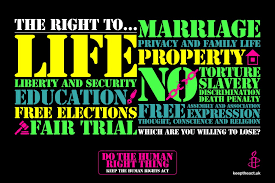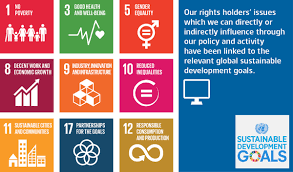Human rights are moral principles or norms that describe certain standards of human behaviour, and are regularly protected as legal rights in municipal and international law. They are commonly understood as inalienable fundamental rights "to which a person is inherently entitled simply because she or he is a human being", and which are "inherent in all human beings" regardless of their nation, location, language, religion, ethnic origin or any other status. They are applicable everywhere and at every time in the sense of being universal, and they are egalitarian in the sense of being the same for everyone.

International human rights law lays down the obligations of Governments to act in certain ways or to refrain from certain acts, in order to promote and protect human rights and fundamental freedoms of individuals or groups.
One of the great achievements of the United Nations is the creation of a comprehensive body of human rights law—a universal and internationally protected code to which all nations can subscribe and all people aspire. The United Nations has defined a broad range of internationally accepted rights, including civil, cultural, economic, political and social rights. It has also established mechanisms to promote and protect these rights and to assist states in carrying out their responsibilities.
The foundations of this body of law are the Charter of the United Nations and the Universal Declaration of Human Rights, adopted by the General Assembly in 1945 and 1948, respectively. Since then, the United Nations has gradually expanded human rights law to encompass specific standards for women, children, persons with disabilities, minorities and other vulnerable groups, who now possess rights that protect them from discrimination that had long been common in many societies.

Economic, social and cultural rights: The International Covenant on Economic, Social and Cultural Rights entered into force in 1976, and had 164 states parties by the end of October 2016. The human rights that the Covenant seeks to promote and protect include: the right to work in just and favourable conditions; the right to social protection, to an adequate standard of living and to the highest attainable standards of physical and mental well-being;
the right to education and the enjoyment of benefits of cultural freedom and scientific progress.
Civil and political rights: The International Covenant on Civil and Political Rights and its First Optional Protocol entered into force in 1976. The Covenant had 167 states parties by the end of 2010. The Second Optional Protocol was adopted in 1989. The Covenant deals with such rights as freedom of movement; equality before the law; the right to a fair trial and presumption of innocence; freedom of thought, conscience and religion; freedom of opinion and expression; peaceful assembly; freedom of association; participation in public affairs and elections; and protection of minority rights. It prohibits arbitrary deprivation of life; torture, cruel or degrading treatment or punishment; slavery and forced labour; arbitrary arrest or detention; arbitrary interference with privacy; war propaganda; discrimination; and advocacy of racial or religious hatred.

In 1966, the International Covenant on Civil and Political Rights (ICCPR) and the International Covenant on Economic, Social and Cultural Rights (ICESCR) were adopted by the United Nations, between them making the rights contained in the UDHR binding on all states that have signed this treaty, creating human-rights law.
Since then numerous other treaties (pieces of legislation) have been offered at the international level. They are generally known as human rights instruments. Some of the most significant, referred to (with ICCPR and ICESCR) as "the seven core treaties", are:
- Convention on the Elimination of All Forms of Discrimination Against Women (CEDAW) (adopted 1979, entry into force: 1981)
- Convention on the Elimination of All Forms of Racial Discrimination (CERD) (adopted 1966, entry into force: 1969)
- Convention on the Rights of Persons with Disabilities (CRPD) (adopted 2006, entry into force: 2008)
- Convention on the Rights of the Child (CRC) (adopted 1989, entry into force: 1989)
- United Nations Convention Against Torture (CAT) (adopted 1984, entry into force: 1987)
- International Convention on the Protection of the Rights of All Migrant Workers and Members of their Families (ICRMW or more often MWC) (adopted 1990, entry into force: 2003)

Every human being has the inherent right to life. This right shall be protected by law. No one shall be arbitrarily deprived of his life: Article 6.1 of the International Covenant on Civil and Political Rights
The right to life is the essential right that a human being has the right not to be killed by another human being. The concept of a right to life is central to debates on the issues of abortion, capital punishment, euthanasia, self defence and war. According to many human rights activists, the death penalty violates this right.[79] The United Nations has called on states retaining the death penalty to establish a moratorium on capital punishment with a view to its abolition.[80] States which do not do so face considerable moral and political pressure.
Throughout history, torture has been used as a method of political re-education, interrogation, punishment, and coercion. In addition to state-sponsored torture, individuals or groups may be motivated to inflict torture on others for similar reasons to those of a state; however, the motive for torture can also be for the sadistic gratification of the torturer, as in the Moors murders.

If you love this UPVOTE.
If you want people to know RESTEEM.
If you want more of this FOLLOW.
@originalworks
Congratulations! This post has been upvoted from the communal account, @minnowsupport, by heyteehem17 from the Minnow Support Project. It's a witness project run by aggroed, ausbitbank, teamsteem, theprophet0, someguy123, neoxian, followbtcnews, and netuoso. The goal is to help Steemit grow by supporting Minnows. Please find us at the Peace, Abundance, and Liberty Network (PALnet) Discord Channel. It's a completely public and open space to all members of the Steemit community who voluntarily choose to be there.
If you would like to delegate to the Minnow Support Project you can do so by clicking on the following links: 50SP, 100SP, 250SP, 500SP, 1000SP, 5000SP.
Be sure to leave at least 50SP undelegated on your account.